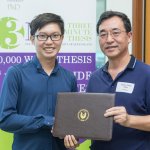By the SMU Postgraduate Research Programmes Team
Wondering if you would be a good fit for a PhD place? Curious about what professors look for when admitting PhD students?
We spoke to some of our Programme Directors to share their secrets on what SMU looks for in PhD candidates. These views are represented by Associate Professor of Psychology William Tov (Programme Director, PhD in Psychology), Associate Professor of Economics Anthony Tay (Programme Director, PhD in Economics) and Associate Professor of Information Systems Baihua Zheng (Programme Director, PhD in Information Systems).
Why should I do a PhD?
A/Prof Tay (Economics): Perhaps we should start with what a PhD programme does. A PhD programme trains you to do frontier research in a specific discipline. In other words, it trains you to create new knowledge; to find answers to questions that no one has yet been able to answer; to question our current view of the world; and to deliver new insights (with evidence and proof, of course!) that lead to an improved understanding of how the world works. Do a PhD if you want to learn how to do frontier research—and pick a PhD programme that can deliver this.
A/Prof Tov (Psychology): The reasons to do a PhD will depend on the individuals and their circumstances. But there are some good reasons that tend to be shared among many who have enjoyed their PhD education and done well after obtaining their PhD degree. One important reason is to acquire the domain knowledge and research skills that can be obtained only through dedicated and disciplined training. These knowledge and skill sets give psychologists a unique perspective on human behaviour and enable them to make recommendations based on scientific evidence. This is what separates well-trained PhD psychologists from those who simply advise based on their personal opinions and anecdotal experiences. Many well-trained PhD researchers have made significant theoretical and practical contributions, in either academia or practice. They help us understand and address important issues affecting people and the group, organisational or societal settings they are in.
A/Prof Zheng (Information Systems): People decide to do a PhD for different reasons. It doesn’t matter what the real reasons are. However, you need to know exactly why you want a PhD, and what you want to accomplish at the end of the PhD. Personally, I enjoyed exploring and learning new things, and I wanted to be a good professor. Right before I finished my undergraduate study, HKUST approached me to offer me the opportunity to do a PhD at HKUST with full scholarship, and I decided to take it. I think it is one of the best decisions I have ever made.

Curiosity and determination are important traits successful PhD students have.
Who should do a PhD?
A/Prof Tay (Economics): Many jobs require PhDs, such as professors and researchers at universities and research institutes, analysts at international organisations like the IMF and World Bank. Many firms in industry also do in-house research and they too seek PhD holders. Many other jobs are situated one step away from the frontier, but they too require PhD holders who can understand, digest, teach, and implement new discoveries and ideas. Students who wish to pursue such jobs obviously ought to do a PhD. A loftier but equally valid answer: people who have a calling and desire to learn how to discover and create new knowledge are the ones who should do a PhD.
A/Prof Tov (Psychology): People who realise that textbooks are only temporary snapshots of our current knowledge, they are never the final word on anything. Usually, these are students who, in the course of their learning as a student or at work, ask or recognise important unanswered questions. However, they are not merely satisfied with identifying these questions—they want to find valid and defensible answers to those questions through careful research. The PhD education provides the training to go about identifying important questions and obtaining the scientific evidence to evaluate different competing answers, through systematic research: formulating the hypotheses, designing studies, collecting and analysing data, and interpreting the results.
A/Prof Zheng (Information Systems): In my view, students with following characteristics might consider doing a PhD.
- Fast learner, even without any teacher
- Enjoy challenges
- Willing to work very hard
- Be able to handle pressure

The PhD is a long journey. SMU distinguishes itself through its heavy investment in PhD training and in cultivating collaborative relationships between faculty and students.
Why do a PhD at SMU?
A/Prof Tay (Economics): SMU’s School of Economics is very active in research in many areas: our econometrics research output is in the top five globally, and we have strong groups in several other areas such as international trade, urban economics, industrial organisation, macroeconomics and development. The economics of health and ageing is another area where we have a sizable group actively doing research. We also take our graduate training very seriously; a lot of thought and effort goes into how we can help our students ease into the research life of the school and the profession, and to develop in other areas that would make them good candidates for jobs in academia and industry.
A/Prof Tov (Psychology): SMU’s psychology department’s faculty members are internationally recognised experts in industrial-organisational psychology, social psychology, cultural psychology, evolutionary psychology and the psychology of well-being. Our faculty are doing innovative research. They have extensive international professional networks and they collaborate with other top experts in psychology as well as non-psychology disciplines. As a small to mid-size programme, we invest heavily in the training of our PhD students. The faculty prefer to cultivate strong collaborative relationships with students rather than adhere strictly to a mentor-mentee model.
A/Prof Zheng (Information Systems): I think the first and most important consideration in choosing a PhD programme is whether the university is strong at the research that a student is passionate about. The School of Information Systems at SMU aims for excellence both in fundamental contribution to academic knowledge, as well as in creating technology with practical impact. There are five focused research areas: Cybersecurity, Data Management & Analytics, Information Systems & Management, Intelligent Systems & Decision Analytics, and Software & Cyber-Physical Systems. Centered around these five areas, our PhD Programme develops researchers and educators who address deep technology challenges in real-world information systems that impact business processes or management, or who develop tools and methodologies to translate business goals into technological solutions.
What characteristics do successful PhD candidates share?
A/Prof Tay (Economics): Ultimately, successful PhD candidates have a deep curiosity and an irresistible desire to understand the core mechanisms underlying why things are the way they are. Other necessary characteristics: creativity, persistence, the ability to get things done, and the ability to ask the right questions. This last skill is extremely difficult to acquire, and most researchers spend all of their careers developing it.
A/Prof Tov (Psychology): They are both intellectually curious and empirically oriented. What that means is that they are not simply “interested in thinking about the psychology of people” but also ask good research questions and have interesting ideas about how to answer those questions (e.g. what kind of study they would design to shed light on the problem). Successful PhD candidates have a positive learning orientation. They are not out to show that they are better than everyone else. Instead, they believe in collaborating with and learning from each other. They are self-disciplined and believe in setting and working towards specific goals that are challenging and realistic.

SMU’s state-of-the-art facilities make it easy to explore your intellectual curiosity.
What makes a strong PhD application? What do you look for in PhD applications?
A/Prof Tay (Economics): We look for evidence that the applicant has the desire and potential to do research, that the applicant has the curiosity and urge to discover which would drive that research, as well as evidence that the student will be able to handle, or will learn to handle, the technical aspects of modern economics research.
A/Prof Tov (Psychology): We look for applicants with the potential of the characteristics I had mentioned previously. Students with some research experience (e.g. worked as research assistants, conducted a thesis study in psychology, etc.) and positive evaluations from their research supervisors will have an advantage. Strong applicants are able to articulate their research interests in their personal statements and demonstrate that they have a passion for empirical research. Really strong applicants can not only propose some research questions, but also some ideas about how they might investigate it. Finally, to ensure the student will benefit most from our mentorship, we look for applicants whose research interests match the research areas of the faculty; although the match need not always be at the specific level of a detailed research topic.
A/Prof Zheng (Information Systems): In my view, a strong application is the one that is articulate about his/her passion, and demonstrates his/her potential for being a creative, hardworking, and productive researcher. In addition, prior research experience and publication(s) definitely make the application even more competitive.
What is the most important part of the application?
A/Prof Tay (Economics): It is impossible to point to any one part of an application as the most important. We look at the application package as a whole. We allow stronger parts to compensate the weaker parts, but treat every component seriously.
A/Prof Tov (Psychology): While all application materials are important, the applicant should pay extra attention to their personal statement and the reference letters. Many applicants will have good grades, but what often helps us decide whether a student will excel in our programme are the experiences and characteristics that they (and their referees) articulate in their statements.
What are some common mistakes applicants make when applying to PhD programmes?
A/Prof Tay (Economics): Sloppy personal statements; inconsistencies and obvious errors in the CV; putting in a research proposal that you are unable to defend at your interview.
A/Prof Tov (Psychology): The SMU PhD programme is aimed at developing empirical researchers. One common mistake by applicants is simply emphasising their general interest in psychology without specifying their relevant background, research interests and career plans. In terms of the fields of psychology, applicants who are primarily interested in counselling or clinical PhD training are often not considered as we do not offer training in these areas.
Do you have any application tips and recommendations for prospective students?
A/Prof Tay (Economics): Be honest in your application, and don’t try to hide weaknesses. For instance, we allow SMU, NUS, and NTU students to waive the GRE and TOEFL. But if you don’t have a strong mathematical background as shown in your transcript, then waiving the GRE will not help you (quite the contrary!). Anticipate questions that the reviewer will have regarding your application and try to address them in your application. This is partly what the ‘Personal Statement’ component is there for. Put yourself in the shoes of the reviewer, and ask: if you have hundreds of strong candidates applying for your programme, would your application stand out? Is there anything that would cause your application to be denied? Having said this, you shouldn’t oversell either. The ultimate goal is for the school, and for you, to find the best match.
A/Prof Tov (Psychology): Applicants should spend more time on their personal statement and discuss their research interests/topics and any relevant research experience. They should ideally have in mind one to three SMU psychology faculty members they are interested in working with and should explain in their statement how their interests align with these faculty members. Prior to applying, it is acceptable to email specific faculty members to see if they would be considering any PhD students for the coming year—faculty are unlikely to take on more students if they are already mentoring several, so it is worth consulting the faculty member prior to applying. The email to faculty members should be accompanied by a curriculum vitae. While these emails are not part of the required application materials, faculty members may share the email content with other faculty members during faculty evaluation of applicants.
***
Remember, applications for the August 2017 intake of all SMU’s PhD programmes close on 31 January 2017!
The next intake for all programmes will be in August 2018, and the application period is from 1 Nov 2017 to 31 January 2018. For applicants who are interested in SMU’s PhD in Information Systems programme there will also be a January 2018 intake, and the application period is from 1 April 2017 to 30 June 2017.
We also welcome enquiries at phd@smu.edu.sg.











